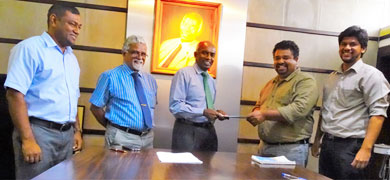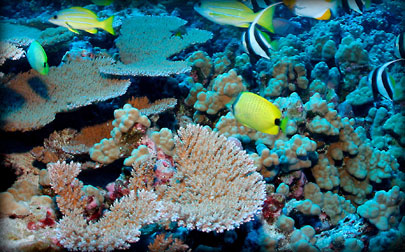Coral reef restoration program to boost local fisheries
The Tokyo Cement Group and Wildlife Research and Conservation Trust (WRCT)
recently entered into a MOU to unite their strengths for coral reef
restoration making it one of the key building blocks of Tokyo Cement's
coral reef rehabilitation initiative along the Eastern coast of Sri
Lanka, a news release stated.
|

From left: Executive Director Salinda Kandapola and Managing
Director S.R. Gnanam of Tokyo Cement Group, exchanging the
MOU with Samitha Harischandra and Gajaba Ellepola of
Wildlife Research and Conservation Trust. figure
 |
Tokyo Cement Group will invest millions of rupees over three years on
a string of activities that will include replanting corals, conducting
scientific research and creating awareness on factors affecting their
growth.
As part of the understanding, the WRCT brings in their expertise in
marine research, training and education to perform field work related to
coral conservation.
WRCT will train the SL Navy and the Department of Wildlife
Conservation in coral nursery preparation, reef-ball placement, coral
planting and after care.
Coral reefs, the richly diverse marine ecosystems known as the
rainforests of the ocean act as the first line of defence against the
ravages of the sea, similarly being the first to be affected by climatic
change and pollution. Especially in countries such as ours, coral reefs
are endangered due to coastal development fuelled by the increase in
population.
Coral reef deterioration impacts not just marine life but also
coastal communities and economies. Given the speed and causes of
destruction, action is required not just to preserve but also to replant
and replenish what remains of our natural coastal barrier.
Recycling wastage
Tokyo Supermix - a ready mix concrete which produces 'Reef Balls',
artificial structures that are used as substrate for new corals to grow
on. With the help of a consortium of partners that include the Blue
Resources Trust, the SL Navy and DWC, these Reef Balls are placed on the
ocean bed in areas such as Pasikudah, Kayenkerni, Dutch Bay, Pigeon
Island, all the way up to Jaffna.
A research scientist at WRCT, zologist Gajaba Ellepola said "As a
keystone species to the reef ecosystem, providing essential habitat and
supporting an amazing diversity of life, restoration of coral
communities is necessary for the recovery and resilience of local
fisheries and the conservation of marine resources.
Considering the current rate of decline of coral reefs around Sri
Lanka, just conserving it is not enough.
It is time to go one step further and restore the lost reefs. Coral
restoration activities conducted by WRCT are a part of a larger effort
to restore and conserve local marine resources and enhance local
fisheries and food security.
While the Navy, DWC officers and local fishermen are trained and
assisted with coral restoration, we improve their knowledge about corals
and reef ecosystems.
Ultimately, the project contributes to the sustainable use and
preservation of marine resources for generations to come."
Engaging direct and indirect beneficiaries of a flourishing Coral
habitat, such as local fishing communities, the tourist industry, and
the general public, help create awareness on how everyone can play a
part in conservation efforts and contribute to curtail harmful
activities.
This holistic approach by Tokyo Cement to make a lasting impact was
recognized by the Ceylon Chamber of Commerce in 2014 as the Best
Environmental CSR project.
|

